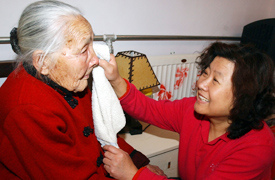|
 |
 |
|
HELPFUL NEIGHBOR: Zhang Pinzheng (right), a resident in Beijing's Tongzhou District, takes care of her neighbor Jin Xuzhen, a 100-year-old widow with no income (WANG CHENGXUAN) |
NEW SCHOOL UNIFORMS: Students in Beijing Chunjiang Primary School show off their new school uniforms donated by Chaoyangmen Neighborhood before International Children's Day in 2010. Most students in the school are children of migrant workers (DU XIN) |
When talking about poverty in China, people tend to conjure up images of farmers struggling in remote mountain villages or in the arid lands of the far west. Yet behind their gleaming skyscrapers and rapidly developing infrastructure, China's cities also hide millions of impoverished residents.
The urban poor numbered 50 million in 2009, or about 8 percent of China's total urban population, according to the annual Blue Book on China's Cities, which was published this August by the Chinese Academy of Social Sciences (CASS).
Luo Peng is one of the urban poor. Out of the window of his room in Maizidian, a wealthy neighborhood in the Chaoyang District of Beijing, he can see upscale office blocks and high-end restaurants serving exotic food, which are patronized by clients in luxury cars.
Luo and his parents share a one-bedroom apartment in a crumbling old building, which, surrounded by brand new luxury condominiums, looks completely out of place.
Ten years ago when Luo was still a student, a serious illness paralyzed his legs and threw his family into poverty. Luo's mother quit her job to take care of him. From then on, the whole family lived on his father's salary, a meager 700 yuan ($110) per month. Medical bills swallowed all their savings and left them deeply in debt.
The Maizidian Neighborhood has a residential population of more than 30,000 and is home to 93 officially poor families. Most of the poor families in the area had chronically ill family members, according to a survey conducted by the Institute of Social Development and Public Policy of Beijing Normal University in 2008.
Only about a third of these poor families had medical insurance that covered all or part of their medical expenses. The other two thirds have to borrow money to pay medical bills.
The survey also revealed that only 30 of the poor families had a steady source of income, and their average income was 1,262 yuan ($198) per household, whereas the average monthly salary for a Beijing urban employee in the same period was 3,726 yuan ($584).
"Urban poverty has become an increasingly salient issue," said Song Yingchang, a researcher with CASS. "The percentage of urban residents living under the government-set minimum living standard has gradually increased from 1996 to 2009."
But researchers admit urban poverty is relative.
| 